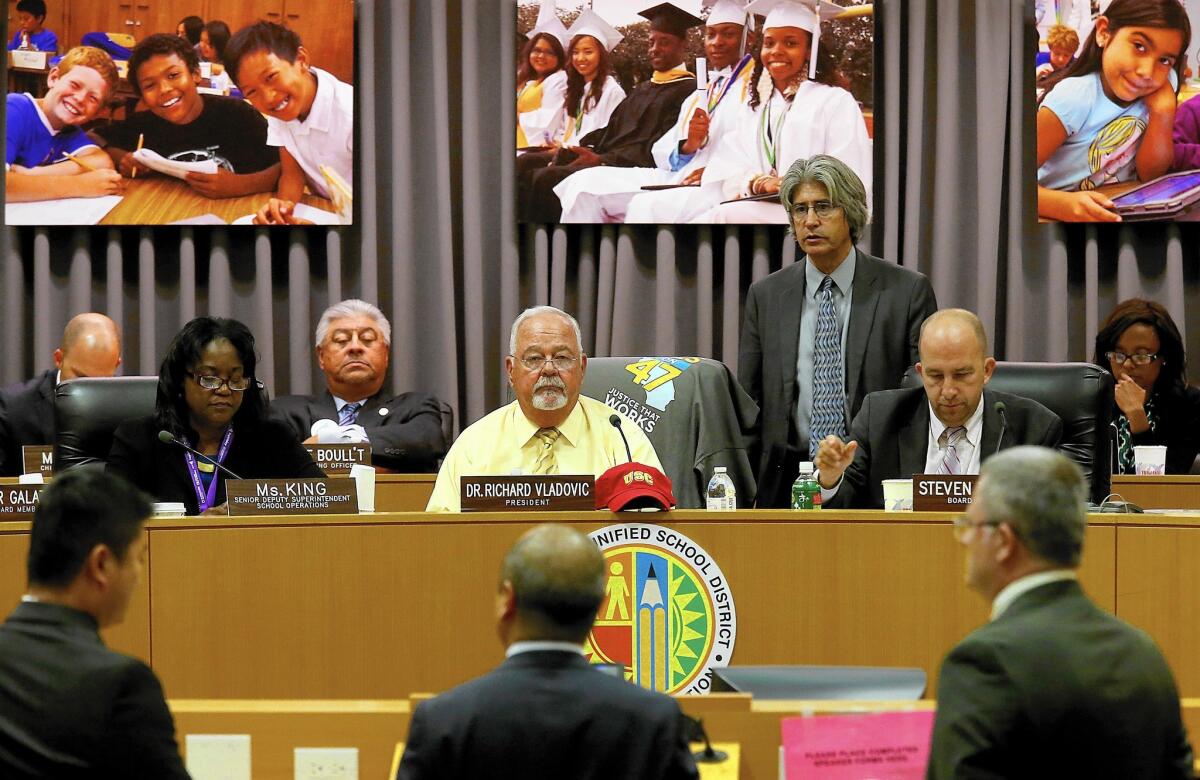In L.A. schools, the time has come for ethnic studies classes

- Share via
An ethnic studies course changed my life when I was a teenager — though not in the way that today’s opponents of ethnic studies seem to fear.
It didn’t teach me to feel like a victim, to despise America or to resent white people. I learned that history doesn’t have to be boring, and that you may have to dig deep beneath the surface to find the truth in a story.
I was a high school junior in 1971, trying to avoid another mind-numbing history course heavy on names, dates and battles. A social studies teacher I liked persuaded me to enroll in her new class. She was a rabble-rousing feminist, a Russian Jew who’d offered to teach “Black History” on a campus where almost every student was black.
In her class, we examined pictures of slave ships, where black Africans were shackled and stacked like wood en route to America. We discussed dimensions of slavery that went beyond the cotton gin and the Civil War. She taught us about slave revolts and abolition campaigns; about the strength it took to survive and the courage it took to resist.
It was a perspective I hadn’t encountered in other history classes — where slaves were grinning dark-skinned lackeys, singing as they picked cotton, and the accomplishments of black Americans began and ended with the peanut and George Washington Carver.
The class refocused the lens through which I viewed my history. It made me a better student: more skeptical, less gullible and more willing to challenge my teachers.
I hadn’t realized until then how much the caricatures of those early lessons had marked me; I’d been bewildered and embarrassed by my ancestors’ inadequacies. But going forward, a new narrative — of bravery, resilience and defiance — motivated me.
I thought of that passage in my life when I read last week that the Los Angeles Board of Education has decreed that, beginning in three years, no high school student will graduate without taking an ethnic studies class.
::
You can cue the eye-rolling here. I know the requirement is apt to play like an exercise in political correctness — or just another example of school district leaders ignoring the important stuff to tinker around the edges.
But supporters say this makes Los Angeles a pioneer in a movement whose time has come, particularly in school districts that are heavily minority and have lots of immigrant students. The school board voted 6 to 1 to approve the requirement last month, after more than 1,000 people — most of them high school students — turned out at a rally to win board members’ support.
A few weeks later, the San Francisco school board ordered every high school in that district to offer ethnic studies, after a six-year pilot program on five campuses found that students in the classes had fewer absences and higher grades than others.
Social studies teacher Jose Lara, who helped organize the Los Angeles campaign, said he’s heard from educators from school districts in San Diego, San Bernardino and Ventura counties who want to explore similar requirements.
“I think it’s something that a lot of people support, but it hasn’t been at the top of their list,” said Lara, who teaches at Santee High in South Los Angeles. “Now that we’ve shown it can be done, other people will be getting busy.”
The idea hasn’t fared so well in other places. A movement to require ethnic studies failed in Texas, and an Arizona program was dismantled after lawmakers banned ethnic studies classes, contending they promote “ethnic chauvinism” and foster race-based resentment, rather than patriotism.
In Los Angeles, Lara’s been gratified, and a little surprised, by the lack of criticism the idea encountered. “The critiques have been mostly logistical,” he said. “They haven’t been on whether it should be taught or not. Even during the school board debate, the discussion revolved around how are we going to implement it, not whether we should have it.”
::
Lara has heard the criticism that ethnic classes tend to be feel-good fluff; a way for lazy students to lift a sagging GPA without having to do much work.
He insists that the new courses will be challenging. “That’s critical to what makes them important,” he said. “The point of ethnic studies is for students to see themselves as scholars. There’s something empowering about seeing yourself in the curriculum, and developing pride and respect for your identity.”
He gets no argument on that from me. But as much as I’m heartened by the vision, I wonder how the district will manage the execution.
Los Angeles schools already offer a hodgepodge of elective ethnic studies classes. The number has shrunk dramatically as high schools focus more on preparing kids for high-stakes exams. “There’s a demand among students, but the classes are hard to get,” said Lara. “Because looking at race and ethnicity is not on the test.”
He’s counting on students and teachers to keep the heat on district officials. “This is something that’s truly as grass-roots as it gets,” he said. “There’s no big corporations, no major supporters, just teachers and students and community members.
“When there was no money for a bus to bring students down to the school board, teachers started reaching into their pockets and soliciting online donations. We heard from people all across the country — teachers, parents, professors, saying, ‘Here’s $25. And I wish I could be there.’
“It’s been pretty amazing,” he said. “It’s an idea whose time has come.”
Again.
Twitter: @SandyBanksLAT
More to Read
Sign up for Essential California
The most important California stories and recommendations in your inbox every morning.
You may occasionally receive promotional content from the Los Angeles Times.











